Photo: Natalia Gw
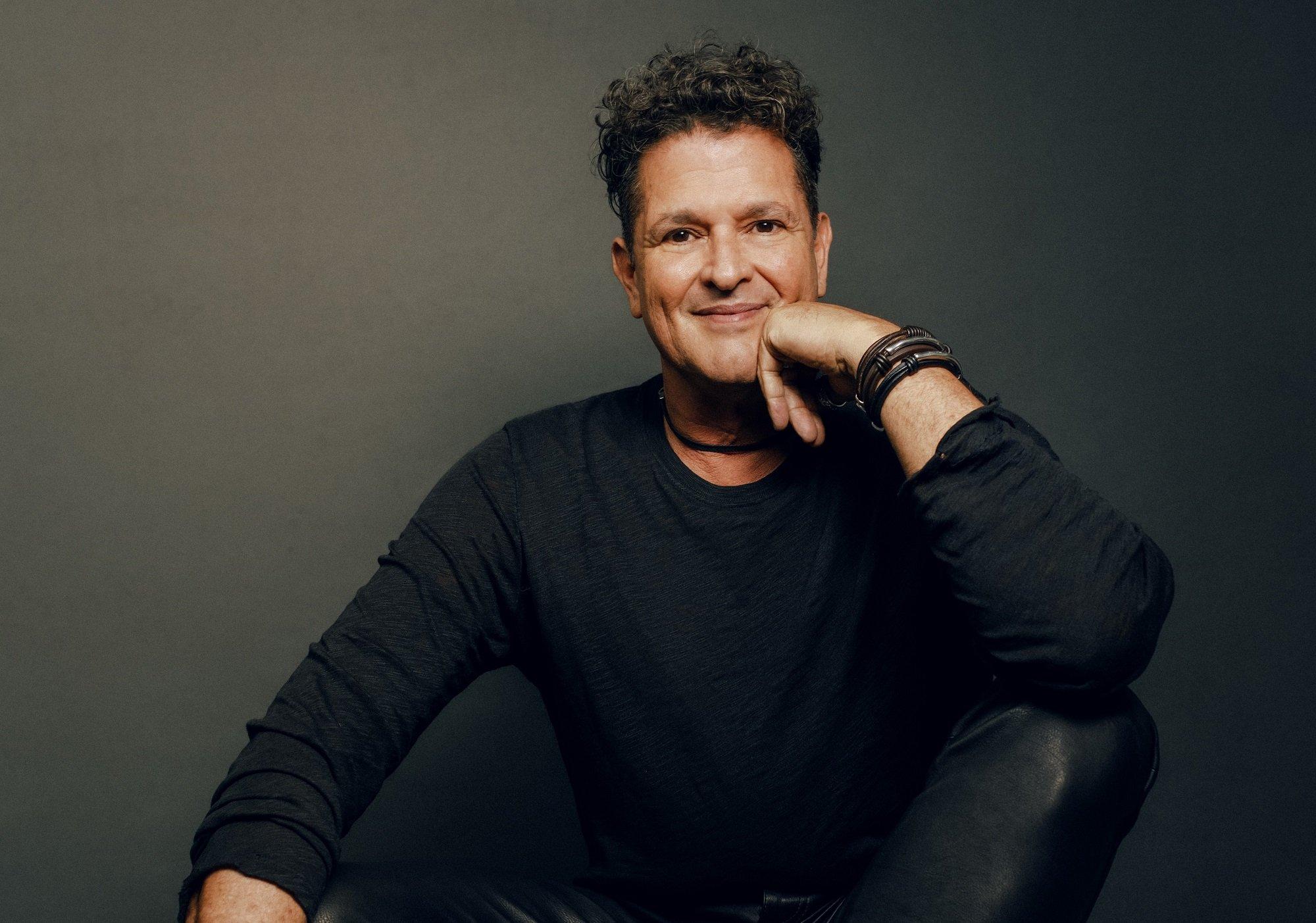
interview
Carlos Vives, The 2024 Latin Recording Academy Person Of The Year, On The Colombia Music & Culture That Made Him
Carlos Vives reflects on his four-decade journey in entertainment, from beginnings as a telenovela star to becoming a revolutionary Latin music icon.
Carlos Vives has been integral to culture, entertainment, and music in Latin America for four decades. In the '80s, mothers and tías fell in love with his telenovela roles in, and his music has captivated — and continues to captivate — generations.
In recognition of his sound and magic, The Latin Recording Academy is honoring Carlos Vives as Person Of The Year during its 25th anniversary. Vives is the third Colombian to receive this distinction — following Shakira in 2011 and Juanes in 2019 — and will be honored at a gala ahead on Wednesday, Nov. 13. Vives is also among the recently announced performers at the ceremony, which will air live Thursday, Nov. 14, from Miami.
Read more: 2024 Latin GRAMMYs: See The Full Nominations List
Musically, Carlos Vives forged a fresh path for Colombian sound, creating "el rock de mi pueblo" (my town's rock): the perfect sonic marriage of traditional vallenato and cumbia rhythms with rock and pop instrumentation. This musical audacity resulted in iconic tracks like "La Gota Fría," "Pa' Mayte," "Carito," and "Déjame Entrar," which were inescapable in the mid-1990s and turn of the century.
"When people ask me about the real importance [of my music], it felt 32 years ago that our music didn't just have a past," Vives tells GRAMMY.com in an exclusive interview.
The boldness with which Vives incorporated his musical roots while projecting toward the future became the most potent weapon in his arsenal. These elements proved fundamental in developing a unique sound, transcending borders, and transforming him into a Colombian musical ambassador.
"We can tell young people that they don't have to make music that's successful elsewhere – they have countless instruments to create their own modern, successful music with their identity," adds the singer.
Carlos Vives' story encompasses radio hits, two GRAMMYs Awards and 18 Latin GRAMMYs (ahead of the 2024 ceremony), and over 20 million albums sold, but his real success comes from his philanthropic efforts.
The singer is a faithful advocate for the sustainable development of his hometown, Santa Marta, and the preservation of its natural environment through the Tras La Perla initiative, created in 2015. His social commitment also extends to the next generation of musical creators. In 2016, he founded the RíoGrande music school, where he cultivates a love for music and Colombian identity in children and teenagers.
Ahead of receiving the Latin Recording Academy Person Of The Year honor, Vives spoke with GRAMMY.com about his musical beginnings and his time as a telenovela star. During the interview, he revealed some secrets about one of his most celebrated collaborations. He honored his departed friend and bandmate maestro Egidio Cuadrado, who accompanied him for three decades.
This interview has been edited for length and clarity.
You were born into vallenato, but do you remember the first time you heard one?
These moments are rooted in my childhood. I remember how music would arrive at our home in Santa Marta, coming from the provinces — that's actually why I named my band La Provincia. Over time, I discovered that many of the people who had captivated me with their personalities, songs, and stories came from the villages near Santa Marta.
I remember singing "Sin Ti" by Nafer Durán when I was six — my father taught me that one. It was very popular during my childhood, and I later recorded it as a tribute to him. It's one of those cherished vallenatos that have become part of the genre's history. My connection to this music is fundamentally emotional. At one point in my life, it felt like a lost world to me. In the end, I discovered that it wasn't just about singing something from our tradition that I'd learned as a child — it was understanding that vallenato wasn't just part of the past but needed to be part of the future.
The juglares [traditional troubadours] have been very important in your artistic life. You mention them often in interviews. What did they mean to you?
My uncle Rodrigo and my father are both doctors. My father would travel through La Guajira and knew all these musicians. The juglares always had a special affection for doctors and always found support in them. They would often visit our home. We'd hear stories about Leandro Díaz, who was blind and composed "Matilde Lina," or about Carlos Huerta, the singer from Fonseca, or Luis Enrique Martínez. I grew up listening to doctors, and my father's friends talk about each of them.
To me, they've been the spirits that sustain everything that flows from vallenato music. They were farmers, and that's the direct connection to true folklore. Before the recording industry existed, these genres and musical styles were already there — the same ones the industry later used to make records and cassettes. They were oral traditions.
The juglares, with their popular poetic dimension, ability to improvise, versatility, mastery of Spanish, and social role as communicators and chroniclers, are the foundation of what I consider folklore.
How did your musical career begin? Because it wasn't with vallenato, but with pop.
It started way before that! I had a TV show where I sang ballads called "Pequeños Gigantes" (1983). I value that entire journey. Then, when I arrived in Puerto Rico, I got my first record deal and recorded the albums No Podrás Escapar De Mí and Al Centro De La Ciudad. Since we were raised to love all kinds of music, we've happily sung everything from rancheras to ballads to rock and roll.
These recordings happened alongside your work in telenovelas. How did you start your acting career?
I started out studying pre-med, but one day, I discovered the National School of Dramatic Arts. I enrolled while I was already singing in different venues. I was a waiter, I sang, and then I got a theater role, followed by the children's show "Pequeños Gigantes," which was a great school for me.
From there, I moved on to daytime soap operas and Sunday children's shows until I reached prime time. I starred in "Tuyo es mi corazón" (1985) with Amparo Grisales, "Gallito Ramírez" (1986) with Margarita Rosa de Francisco, and "La mujer doble" (1992) with Rudy Rodríguez. These were shows about Colombian customs and very local stories from when we weren't yet thinking about selling much television internationally.
Without a doubt, the telenovela about composer Rafael Escalona's life was a turning point in your career, and musically, it opened the path to your passion for vallenato. Why was playing Escalona so transformative for you?
It wasn't a coincidence because the company that gave me the role knew my work, and I sang vallenato. When the project came up, the executives immediately thought of me. They told me I had to learn over 40 of Escalona's songs. When I started exploring the repertoire, I realized I knew all the songs from childhood. They had been dormant for 30 or 40 years.
Escalona went to school with my father; he was a beloved and well-known figure. His songs were the first to cross Colombian borders, reaching Spain, Central America, and the Caribbean.
Incorporating vallenato into your sound was a deliberate choice. You call yourself the son of vallenato. Why do you say this genre is your father?
Absolutely! You discover things when you immerse yourself in provincial folklore like vallenato.
When you understand Colombia's geography, you know why I say vallenato is the child of cumbia. These are ancestral patterns — vallenato has mysteries in its percussion, where its potential for modernity lies.
When the first bassist added a bass line to vallenato, it became radio-friendly, commercial and a musical genre. Before that, it was oral tradition: box drum, guacharaca [percussion instrument similar to guiro], and guitar. Then accordions came along, but when someone added an electric bass, that became my rock and roll. From that first bass line, people started applying cumbia patterns from vallenato to the drums and keyboard playing. It's a new form of tropical music.
Composer Leandro Díaz told you that you had a treasure with Clásicos de la Provincia. The album was a total revolution and marks the birth of the Vives sound. What was the work behind that production like?
I knew that if I wanted to pursue my rock and roll and pop through this path, I wouldn't be the traditionalist, though I wouldn't disrespect the original patterns either. People said Carlos Vives mixed vallenato with rock, but that's not what happened.
If I interpret a vallenato box drum pattern on a bass or electric guitar with a cumbia groove like in "La Gota Fría," it naturally sounds like rock. The path I chose was to find my town's rock. Ultimately, I was searching for my modern music through our traditions.
I started with vallenato, but its origins led me down a river that flows into the Magdalena, the capital of cumbia. That's why we applied cumbia drum patterns for the first time in "La Gota Fría."
Déjame Entrar earned you your first two Latin GRAMMYs and made you the first Colombian to win a GRAMMY Award. That production also spawned hits that are now Latin music icons. What do you remember about that first ceremony where you emerged victorious?
I have some funny stories about that. I've both enjoyed it and suffered through it. [Two years] earlier, I received three nominations [at the first Latin GRAMMY Awards] and didn't win anything. I told myself: Did you think it would happen right away? That you'd win everything on your first try? No, man, keep working.
I was always surprised to be nominated for anything, given how natural the path I chose was. I didn't have many of those dreams because my motivation was different, and besides, the industry kept telling me I wouldn't get anywhere on this path. I was surprised when The Academy started noticing me.
Twenty years ago, you released El Rock de mi Pueblo, another of your iconic albums that gave name to the Vives sound. Did you expect this style and album to be more alive two decades later than ever?
No! Mainly because it's such an experimental album. It was the last album of a moment when everything went dark. That album was beautiful because it was about playing, being very daring, and telling rock culture, this is your rock, and this is mine. It's almost aggressive to say that my rock is different from yours.
I knew the album had to be called El Rock de mi Pueblo. I started experimenting, and sometimes, I wasn't happy with anything, but I knew I was on the right path. The message is clear. I knew I was sending the right message.
"La Bicicleta" with Shakira is another of your global hits. The track won Song Of The Year and Record Of The Year at the 17th Annual Latin GRAMMYs. Plus, bicycles are part of your life. Tell me the story behind the song.
For Colombians, the bicycle has been a passion since childhood. In the neighborhood, it was crucial; it was always a symbol of freedom. I was writing these crazy ideas, and the Sony president loved them and sent the song to Shakira. With her infinite creativity and musical ability, she created incredible things for it. She added lyrics and some accordion parts that my compadre Egidio Cuadrado had invented.
Then, she conceived a spectacular part where she included me in the story. And she changed the name of the song. In my nostalgia, I had called it "Vallenato Desesperado," but when she started working on the music and sending me messages, she always said, "Here's La Bicicleta."
*Carlos, why are Colombia's vast rivers and wetlands important to you and your country's musical legacy? You even dedicated two albums to your country's rivers, Cumbiana and Cumbiana II.*
Because that's the origin, there were no planes or highways. All our mixing, evolution, and development, even of pre-Hispanic cultures before Spain's arrival, happened because they were connected through rivers. That's why they were amphibious cultures.
Cumbia was a funeral areito of the Chimilas, the amphibious Indians who lived where the river grew wide, in what we call ciénagas [marshlands]. That's the origin of cumbias and the pattern we know with that syncopation, with that upbeat, which was in America before Europe's arrival.
You understand that vallenato is the child of cumbia when you realize that the César River, which tells vallenato stories, flows into the Magdalena River. Rivers are the country's blood, our blood.
2023's Escalona Nunca Se Había Grabado Así earned you your first Latin GRAMMY for Best Cumbia/Vallenato Album, plus the first Latin GRAMMY for your label, Gaira Música Local. What did it mean to you that an album where you return to your roots was awarded so significantly?
First, I was very worried because I was competing with Silvestre [Dangond]. [Laughs.] It was crazy — I couldn't believe I had recorded Escalona so many years ago and was now competing with Silvestre, who had just made the album tribute to [composer] Leandro Díaz.
It was pure joy because it was also my compadre Egidio's dream. It was special because it is also my last recording of him from our final trip together through Provincia de Padilla, which we often toured by bicycle or car while filming scenes.
We returned 30 years later at a time when my compadre had a health problem, from which he never recovered. It was a last breath he gave us, a gift. That final concert in Bogotá, where he could only perform two or three songs because he was very ill, was incredible. He left us a memory, and I have it all recorded.
What legacy did Maestro Egidio Cuadrado leave with you?
My compadre Egidio always represented the province, so I said when he died, the province had died. His great value was that he never stopped being a farmer or a guajiro.
His great value wasn't his virtuosity or innovative accordion techniques but his connection to authentic spirits. He was a true farmer who picked coffee, and although life led him to travel the world with me and live very comfortably, he never stopped being humble.
I always saw in my compadre Egidio that connection to our roots. I turned around and saw that in my small-town rock band, I had an authentic farmer and a vallenato king from Villanueva — it couldn't get better. I always gave him his place as king. In the end, the vallenato that the industry enjoys today is connected to the farmer, nature, and folklore.
The Person Of The Year Gala will be full of surprises for you. How are you preparing?
I start thinking a lot because I'm nostalgic; I'm romantic. My friends in school used to call me Libertad Lamarque because I cried a lot. To explain to young people, Libertad Lamarque was a famous actress when I was a child, and she cried in all her movies.
There's something emotional about Miami. The Latin GRAMMYs were born there. [I remember] the musical style in Miami when I arrived, the family that opened their arms to me, with Cuban, Puerto Rican, Dominican, and Panamanian artists... I arrived into a family. It's been 25 years since that first experience of being surprised by Miami and thinking, What am I doing here? Being surrounded by Emilio Estefan, Celia Cruz, all the pop stars, and me in the middle of it all.
When the Cubans heard my vallenatos, they knew I was their cousin; they loved me very much, supported me, and played my music. That's what Miami has: It shows us familiarity, even those who don't speak Spanish. So many things that connect us have been built there with spirituality, love, and tenacity from the union of two worlds.
I want it to be a celebration of Miami. I want it to be a celebration for everyone: the new generations, those who came after us and are succeeding, and all of us to recognize ourselves in this celebration.
Latest In Latin Music, News & Videos
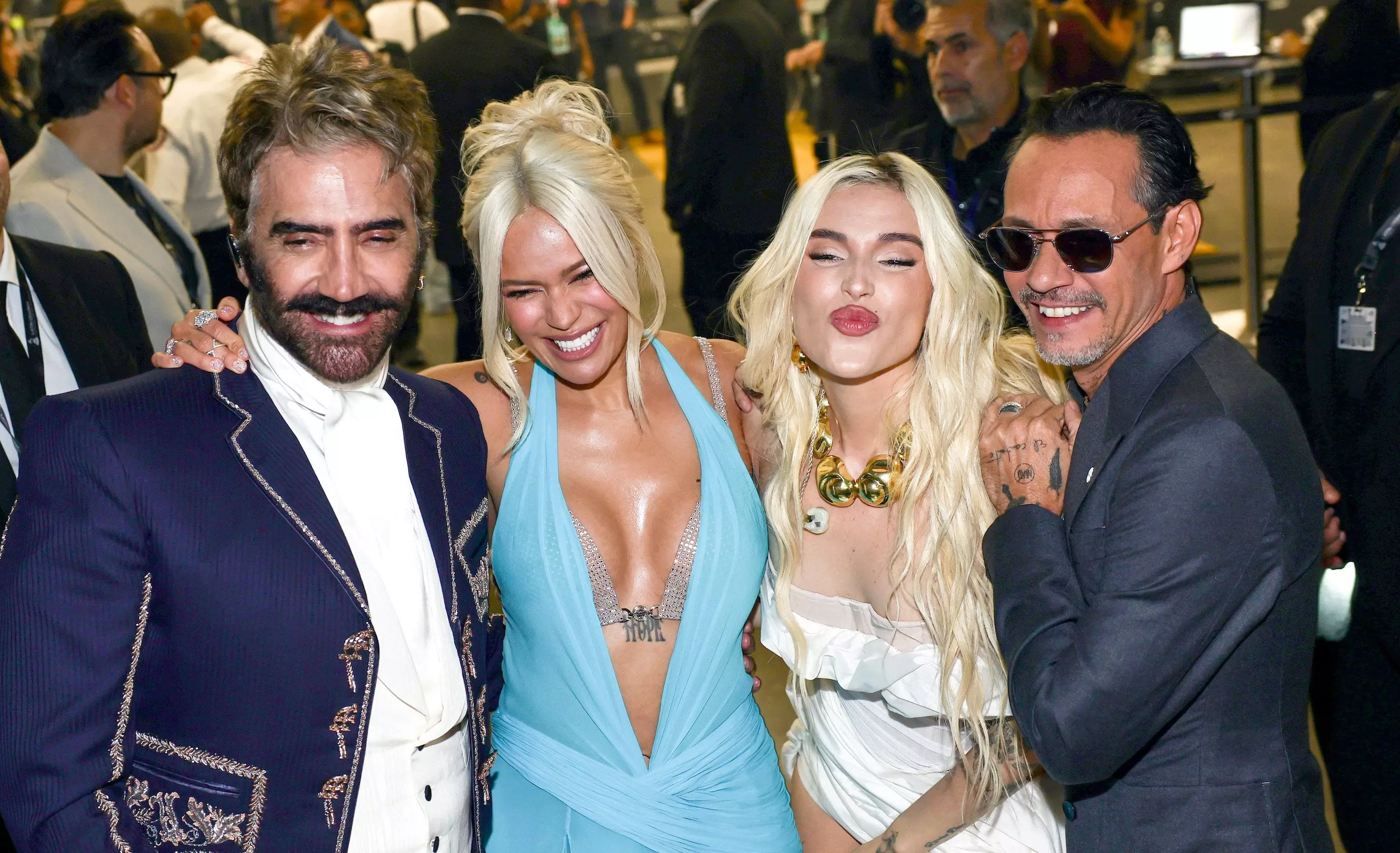
10 Meaningful Moments From The 2024 Latin GRAMMYs: Karol G's Heartfelt Speech, Tributes To Late Legends & More
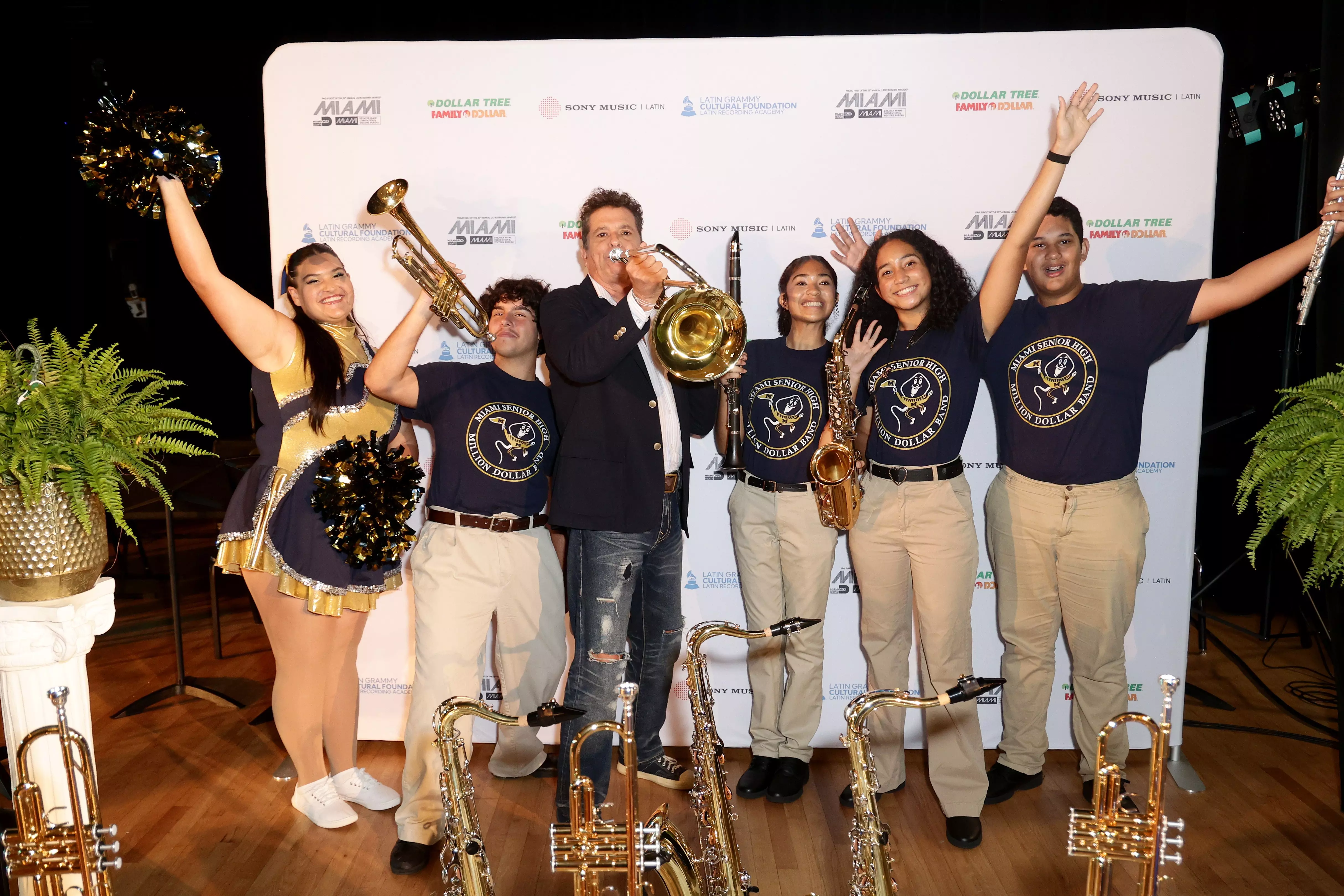
Behind The Scenes At Latin GRAMMY Week 2024: Inside VIP Celebrations & More
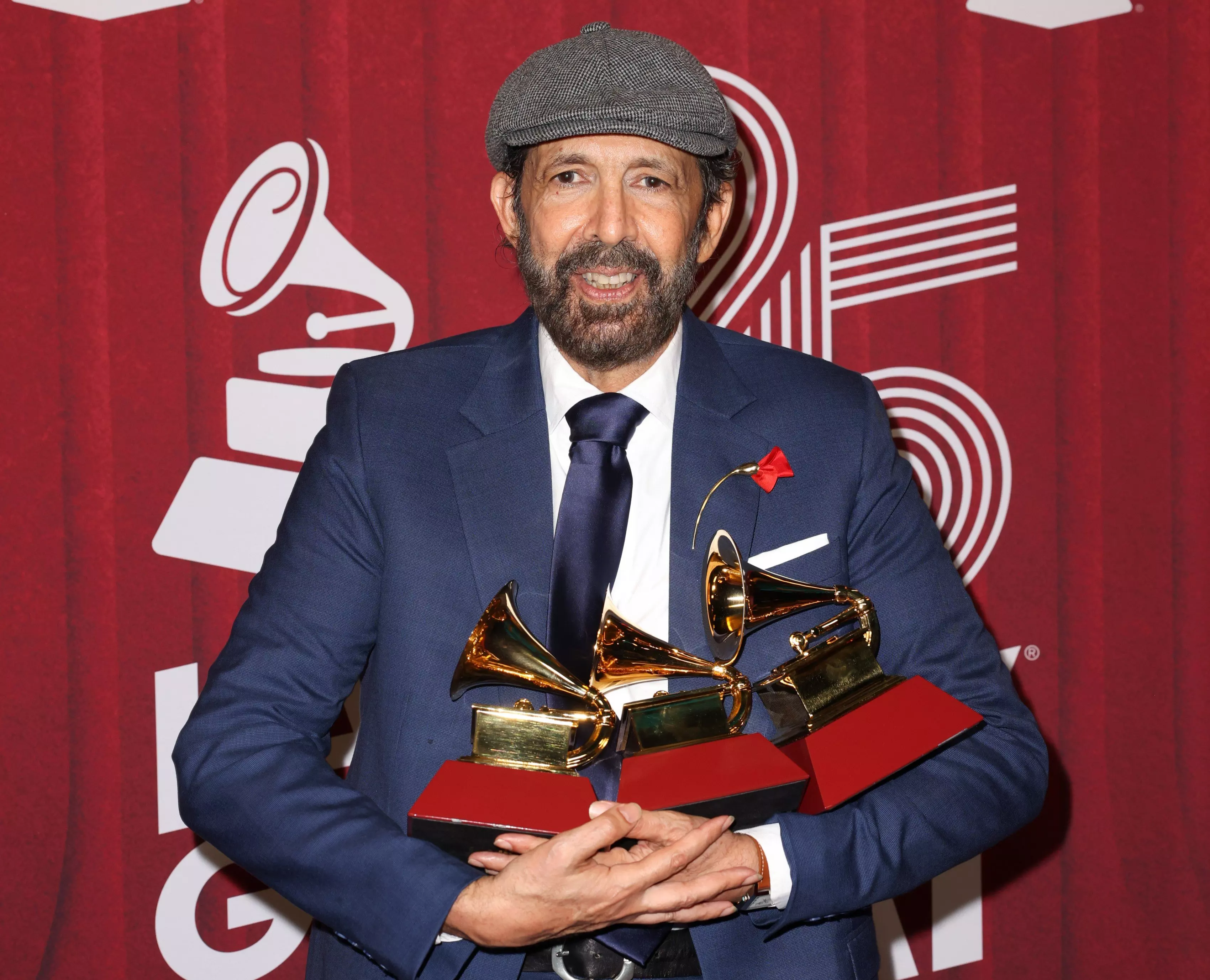
Juan Luis Guerra Sweeps The 2024 Latin GRAMMYs With 'Radio Güira'

Watch: Luis Fonsi Performs "Despacito" & Two More Of His Classics At The 2024 Latin GRAMMYs

Watch: Juan Luis Guerra 4.40 Wins Album Of The Year For 'Radio Güira' | 2024 Latin GRAMMYs
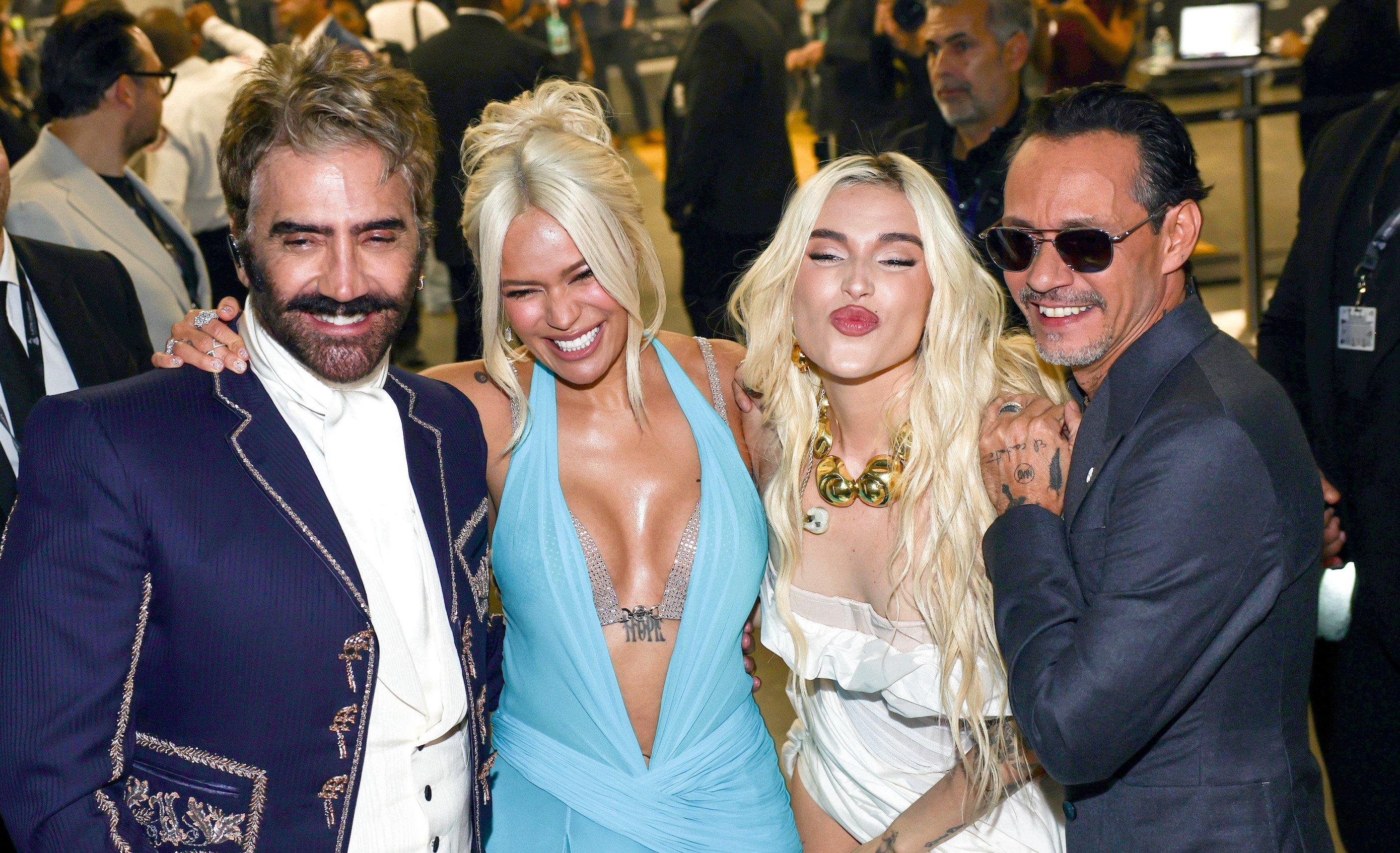
Photo: Getty Images for The Latin Recording Academy
list
10 Meaningful Moments From The 2024 Latin GRAMMYs: Karol G's Heartfelt Speech, Tributes To Late Legends & More
The 25th anniversary of the Latin GRAMMYs was a celebration indeed, spotlighting contemporary stars like Carín León and Anitta while paying homage to veterans like Carlos Vives and Juan Luis Guerra who have paved the way. Revisit 10 highlights here.
One would have expected plenty of pomp and circumstance as the Latin GRAMMYs celebrated their 25th year anniversary. But there were no lengthy speeches or self-congratulatory videos during the Nov. 14 telecast.
This year, the telecast focused on the things that matter: saluting the magic of undying genres like salsa, rock and bossa nova. Honoring the legacies of such Latin American trendsetters as Carlos Vives and Juan Luis Guerra. Giving artists a carefully curated space where to showcase their craft and inspiration.
From the stark cinematic moods of reggaetón to the healing warmth of Afro-Caribbean roots and the bold expansion of música mexicana, here are 10 of the most exciting celebratory moments from the 2024 Latin GRAMMYs.
The Music Of Carlos Vives Is A Priceless Cultural Treasure
Colombian singer/songwriter Carlos Vives was The Latin Recording Academy's 2024 Person Of The Year — a fitting recognition to his groundbreaking fusion of the accordion-heavy vallenato music of his land with rock, pop and even reggae. Vives' path of innovation began with the 1993 album Clásicos de la Provincia, and, like the Latin GRAMMYs, his career has evolved much over the last 25 years.
The singer kicked off the telecast with a career-spanning medley of hits such as "Fruta Fresca" — a rollicking gem off his 1999 classic El Amor de mi Tierra — and the more recent "La Bicicleta." At the end of his performance, he was joined by an enthusiastic group of fellow singers, including Juanes and Camilo. This brisk summary of his creative genius underscored his innate ability to connect with the essence of Latin American culture.
Read More: Watch: Carlos Vives Performs "La Bicicleta," "Robarte Un Beso" & More At The 2024 Latin GRAMMYs
The Moody Soundscapes Of Urbano Continue To Expand
Jagged regaetón beats and ominous trap atmospherics are a natural component of the Latin pop DNA. But the urbano universe continues to grow, experimenting with novel song structures while incorporating references to other genres.
Early on in the telecast, three contemporary stars joined forces for a segment that showcased the ever evolving side of urbano. Eladio Carrión ("Mama's Boy") Quevedo ("Columbia") and Myke Towers ("La Falda") combined their proven commercial appeal with a sophisticated vision.
A True Master Never Stops Learning His Craft
Let's just say that this year's ceremony was a memorable evening for perennial Latin GRAMMY favorite Juan Luis Guerra. The 67-year-old singer/songwriter won the coveted Record Of The Year and Album Of The Year awards, and cherished his Dominican roots in his acceptance speech.
But Guerra also let the music speak for itself in a mesmerizing performance of Record Of The Year winning track "MAMBO 23." A stunning display of craftsmanship, it begins with a dembow beat, incorporates electronic loops, and also switches between the haunting qualities of spiraling bachata lines and the raucous party vibe of traditional merengue — all within the same song. Clearly, Guerra continues to learn and further refine his musical lexicon with each new project.
Read More: Juan Luis Guerra Sweeps The 2024 Latin GRAMMYs With 'Radio Güira'
Three Mexican Legends Are Sorely Missed
Alejandro Fernández | Photo: Getty Images for The Latin Recording Academy
There was a reflective quality to this year's telecast, which included tributes to classic genres and luminaries of the past. Perhaps the most poignant, though, was the segment dedicated to three late giants of Mexican music: Juan Gabriel, José José and Vicente Fernández.
The delicate sadness of Juan Gabriel's "Hasta Que Te Conocí" (performed by Reik and Leonel García), the apocalyptic balada pathos of José José's "El Triste" as a duet (a duet with Carlos Rivera and David Bisbal), and the unapologetic joy of Vicente Fernández's "No Me Sé Rajar" (fittingly, by his son Alejandro) — illustrated the monumental sway that these masters still hold in the Latin music zeitgeist.
Salsa Lives On — And It Grooves Like Crazy
While it is true that the heyday of salsa took place during the '70s and '80s, this is a genre that simply refuses to grow stale. And to prove it, a parade of stars delivered a dazzling tribute to the tenets of salsa fever.
Venezuela's Oscar D'León offered a swinging reading of his 1974 classic "Llorarás," while Colombia's Grupo Niche had the audience chanting along to the chorus of "Una Aventura." Tito Nieves and young stars Luis Figueroa and Christian Alicea were also present, while the salsa romántica royalty of Marc Anthony and La India revived their '90s mega-hit "Vivir Lo Nuestro" in stunning, dynamic form.
Latin Pop Thrives On Emotional Connection
After winning three Latin GRAMMYs last year on the strength of the genre defining Mañana Será Bonito — including the coveted Album Of The Year — KAROL G added another award to her collection on the 2024 telecast. The Colombian star's eclectic 2023 mixtape, Mañana Será Bonito (Bichota Season), won in the Best Urban Music Album category, at a moment when KAROL G is celebrated as one of the world's biggest pop stars.
As she collected the Latin GRAMMY, she focused on the things that matter. "This is about the love that I share with my fans," said a visibly moved KAROL. "And my family, which makes my life so much easier. Without them, I wouldn't have my mental health." The same feeling of emotional openness permeates the songs in both Mañana Será Bonito projects.
This Is Not Your Parents' Música Mexicana
It is definitely not a coincidence that música mexicana is experiencing a massive wave of popularity. The charisma and musical talent of stars like Peso Pluma, Grupo Frontera and Fuerza Régida is augmented by the vision of innovators such as Carín León, who blends effortlessly the folk roots of his native Sonora with cool touches of country and blues.
Introduced by Julieta Venegas and Mon Laferte, León performed "Despídase Bien" — the ending track of his extraordinary 2024 album, Boca Chueca, Vol. 1 — backed by a full band and choir. A thorny electric guitar solo and rousing gospel vocals added gravitas to a song that is Mexican to the core, but does not hesitate to venture out of the box in search of true emotion.
The Old Bossa Nova Classics Are Indestructible
There were no sassy baile funk riddims when Brazilian stars Anitta and Tiago Iorc joined forces for a couple of songs in a dimly lit section of the stage. Instead, the duo launched into a fragile, understated version of Anitta's "Mil Veces," backed only by acoustic guitar and the diva's gorgeous voice.
This intimate moment was followed by "Mas Que Nada" — the whimsical 1963 tune by Jorge Ben that turned Sérgio Mendes and his band Brasil '66 into one of the architects of the bossa nova movement. Mendes passed away in September of this year, and the luminous interpretation by Anitta and Iorc served as the most elegant tribute possible.
Visceral Rock n Roll Will Never Go Out Of Style
One of the most intense moments of the telecast lasted less than two minutes — but will stay in the mind of anyone who ever prophesied the death of rock.
Hailing from Monterrey, Mexico, The Warning — a trio made up by sisters Daniela, Alejandra and Paulina Villarreal Vélez — delivered a welcome jolt of rock 'n'roll with a ferocious version of their hit "Qué Más Quieres." The performance was a reminder of how much raucous fun a trio of guitar, bass, drums, and gutsy vocals can generate. And yes, Latin rock is in excellent health, thank you.
Read More: Watch: The Warning Bring Hard Rock Power To The 2024 Latin GRAMMYs With "Qué Más Quieres"
At The End Of The Day, It's All About The Songs
As is often the case with Latin GRAMMY darling Jorge Drexler, the Uruguayan troubadour had some deep thoughts to share when he received the Song Of The Year honor for the exquisite "Derrumbe" — a non-album single he released in February of this year.
"This is madness," Drexler said after exchanging a hug with Juanes, who announced the winner. He pointed out that he hails from a very small country, and that "Derrumbe" itself was a sad and short song — una cancioncita, he called it.
He thanked the Latin Recording Academy for healing his chronic imposter syndrome and proving that a delicate, unassuming tune like his could win. Then again, that's one of the main missions of the Latin GRAMMYs: to acknowledge the power of a great song to inspire and transform.
Latest In Latin Music, News & Videos

10 Meaningful Moments From The 2024 Latin GRAMMYs: Karol G's Heartfelt Speech, Tributes To Late Legends & More

Behind The Scenes At Latin GRAMMY Week 2024: Inside VIP Celebrations & More

Juan Luis Guerra Sweeps The 2024 Latin GRAMMYs With 'Radio Güira'

Watch: Luis Fonsi Performs "Despacito" & Two More Of His Classics At The 2024 Latin GRAMMYs

Watch: Juan Luis Guerra 4.40 Wins Album Of The Year For 'Radio Güira' | 2024 Latin GRAMMYs
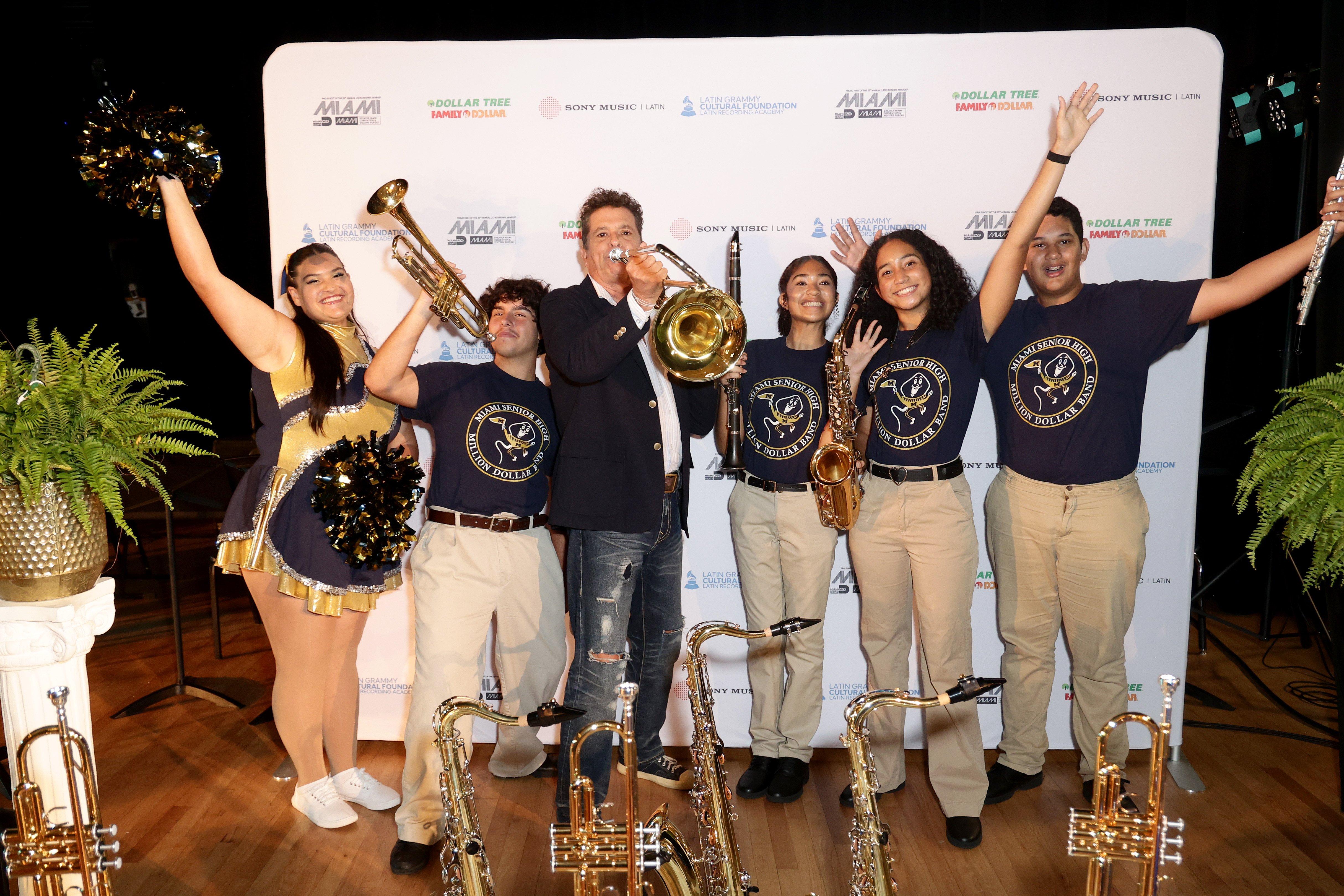
Photo: John Parra/Getty Images for The Latin Recording Academy
list
Behind The Scenes At Latin GRAMMY Week 2024: Inside VIP Celebrations & More
The Latin Music community has been celebrating with a full week of festivities leading up to the 2024 Latin GRAMMYs in Miami, Florida. Here are some behind-the-scenes moments from the biggest week in Latin Music.
The Latin music community is buzzing with excitement following a week of events leading up to the 25th Annual Latin GRAMMY Awards. Held at Miami's Kaseya Center on Nov. 14, the 2024 GRAMMYs showcased the best and the brightest in global Latin sounds.
In the lead-up to The Biggest Night In Latin Music, a series of festivities offered a rare glimpse into the heart of Latin music’s vibrant culture. Latin GRAMMY Week brought artists, producers, and fans together on star-studded red carpets and intimate industry events — each of which was electric with anticipation, celebration, and reflection.
Read more: 2024 Latin GRAMMYs: See The Full Winners & Nominations List
Continue celebrating 25 years of Latin Music excellence with a glimpse behind the scenes at some of the unforgettable moments that have made this week in Miami one to remember.
Leading Ladies Got Their Flowers
One of the first events of Latin GRAMMY week was the 8th edition of the Leading Ladies in Entertainment, a heartfelt celebration of women who have made significant contributions to the arts and entertainment world.
The event was hosted by Latin GRAMMY-nominated artist Becky G (who also performed at the 2024 Latin GRAMMYs) and was held inside inside the Loews Hotel. Portraits of honorees Ana Rosa Santiago, Vivir Quintana, Julieta Venegas and Diana Rodríguez were displayed on elegant arches draped in peach and gold. A warmth and intensity buzzed throughout the room, which was amplified by Becky G's encouragement.
Each honoree's speech reflected the event's theme of elevating women and inspiring the next generation of female leaders. Quintana's powerful speech shared sage wisdom with aspiring music professionals in the room. “You absolutely do not have to change anything about yourself. Just work on your talent, be who you are, and follow your inner compass always,” she told the crowd, sparking a standing ovation.
In a sweet touch to the already outstanding celebration, attendees were invited to create personalized bouquets. The gesture left honorees and guests alike feeling empowered and appreciated, with the evening both symbolically and quite literally giving everyone their flowers for their contributions to Latin music and culture.
Nominees "Swam" With The Big Fish
The Latin GRAMMY Awards do more than recognize artistic excellence — they invite nominees into a circle of industry peers who celebrate each other's achievements. At the Latin GRAMMY Nominee Reception, this vibrant community bonded over a deep appreciation for the artistry, dedication, and hard work it takes to earn this peer-voted honor.
The crowd at the Frost Science Museum’s Ocean Gallery was a mix of first-time Latin GRAMMY nominees such as Latin Mafia and Carlos Rivera, international stars such as Alok, and recently-announced nominees for the 2025 GRAMMYs. Producers and collaborators who work with J Noa, Peso Pluma, Residente, Anitta and Kali Uchis were also in attendance. Guests represented a range of genres and disciplines: violinists, songwriters, DJs, salsa musicians, and even the singing clowns of Payasitas Nifu Nifa, who make children’s music, mingled energetically.
Nominees proudly donned their medallions, capturing this pivotal career moment on the red carpet and posing in front of a giant, golden GRAMMY. The reception featured a stunning aquarium view, and guests could watch the fish, sharks, and stingrays swimming peacefully above them and snapped more photos. The aquarium was a fitting scene: this year’s class of nominees certainly got here by making waves in the music industry.
The Future Sounded Bright As Rising Stars Hit The Stage
Held at Miami Beach’s Faena Forum and presented by Mastercard and Bank of America, the third annual Best New Artist Showcase brought an exciting spotlight to the future of Latin music. Over a performance-filled day, each of the seven Best New Artist nominees brought their unique flavor to the stage.
From Nicolle Horbath’s fresh popteño style to 13-year-old Kevin Aguilar’s heartfelt mariachi and corridos, every performance showcased a captivating fusion of genres. The crowd was especially energized when the three-piece girl group DARUMAS delivered an electrifying rock cover of Whitney Houston’s "I Wanna Dance with Somebody," getting everyone on their feet.
Other standout performances included Agris, Cacá Magalhães, Os Garotins, Íñigo Quintero, Sofi Saar, and Ela Taubert. Ultimately, it was Ela Taubert who took home the Latin GRAMMY on Thursday night, and she closed out the week with an emotional performance of her hit "¿Cómo Pasó?" alongside Joe Jonas at the 2024 Latin GRAMMYs.
This showcase not only highlighted the diverse talent shaping the future of Latin music but also gave attendees an unforgettable opportunity to experience the next generation of superstars up close.
Carlos Vives' Life & Influence Was Fêted
The annual Latin GRAMMY Person Of The Year Year celebration honored Colombian artist and philanthropist Carlos Vives. The annual event drew a crowd of about 2,000 attendees to the Miami Beach Convention Center, including legends in Latin music and the next generation of stars.
Guests arrived in ornate attire, enjoying drinks and capturing memories with the Glambot’s interactive photo experience. Among the star-studded crowd were Camilo, Grupo Frontera, Rico Love, Aymee Nuviola, AleMor, and many more. The mayor of Miami also took the stage to offer a few heartfelt words of appreciation for Vives’ contributions.
The evening culminated in a historic moment when six previous Latin GRAMMY Person Of The Year honorees gathered to pay tribute to Vives, a powerful salute to his legacy and impact on the Latin music community. Onstage at the 2024 Latin GRAMMYs, Carlos Vives was saluted by 2023 MusiCares Person Of The Year Jon Bon Jovi.
Somos Familia
In collaboration with the Recording Academy’s Florida Chapter,BMI and Rebeleon Entertainment, Latin music producers and artists gathered to celebrate in true Miami fashion — with a party.
At the Los Producers event, attendees filled the venue’s balconies for the best views, while Latin GRAMMY nominees such as Cimafunk, Agris, Latin Mafia, and Trooko were spotted among the crowd. Guests danced and mingled to a mix of '80s classics and rock, all delivered in a Spanglish blend that had the crowd singing along. But the night truly came alive during a series of energetic performances from the likes of five-time Latin GRAMMY winner Luis Fonsi, The Warning, and Bruses.
Prior to taking the stage, Fonsi and his bandmates shared a sweet moment. The group sang "Happy Birthday" and brought out a cake for their guitarist, exemplifying the tight-knit family bond that defines the Latin music community.
GRAMMY U Gained On The Ground Experience
Throughout the week, over 75 GRAMMY U members volunteered on the talent team escorting artists such as Gloria Estefan and DARUMAS.
Florida Chapter Member Amy Torres shared her experience: "My dream has always been to work in the Latin music industry so this is a dream come true. This week, I’ve seen a lot of artists I’ve admired growing up and made connections both within GRAMMY U and outside of the organization."
Patience Murray, a non-student GRAMMY U Member and singer/songwriter based in Florida, described GRAMMY Week as a "mind-blowing experience." "Being able to witness a music event of this caliber and magnitude felt like a once-in-a-lifetime manifestation exercise, and I'm grateful to have seen the stages I dream to one day perform on," she said, adding that her favorite part of the week was connecting with other GRAMMY U members.
"I have gained so much respect for the talent teams who work tirelessly behind the scenes to ensure that every show looks effortless and enjoyable for the fans," Murray added.
2024 Latin GRAMMY Week was the definitive celebration of music's power to connect and inspire. As Latin music cements its place on the global stage, it’s clear that these artists are not only shaping the future of the industry but also fostering a greater sense of shared identity that transcends borders.
Latest Latin Recording Academy News & Initiatives

10 Meaningful Moments From The 2024 Latin GRAMMYs: Karol G's Heartfelt Speech, Tributes To Late Legends & More

Behind The Scenes At Latin GRAMMY Week 2024: Inside VIP Celebrations & More

Juan Luis Guerra Sweeps The 2024 Latin GRAMMYs With 'Radio Güira'

Watch: Luis Fonsi Performs "Despacito" & Two More Of His Classics At The 2024 Latin GRAMMYs

Watch: Juan Luis Guerra 4.40 Wins Album Of The Year For 'Radio Güira' | 2024 Latin GRAMMYs
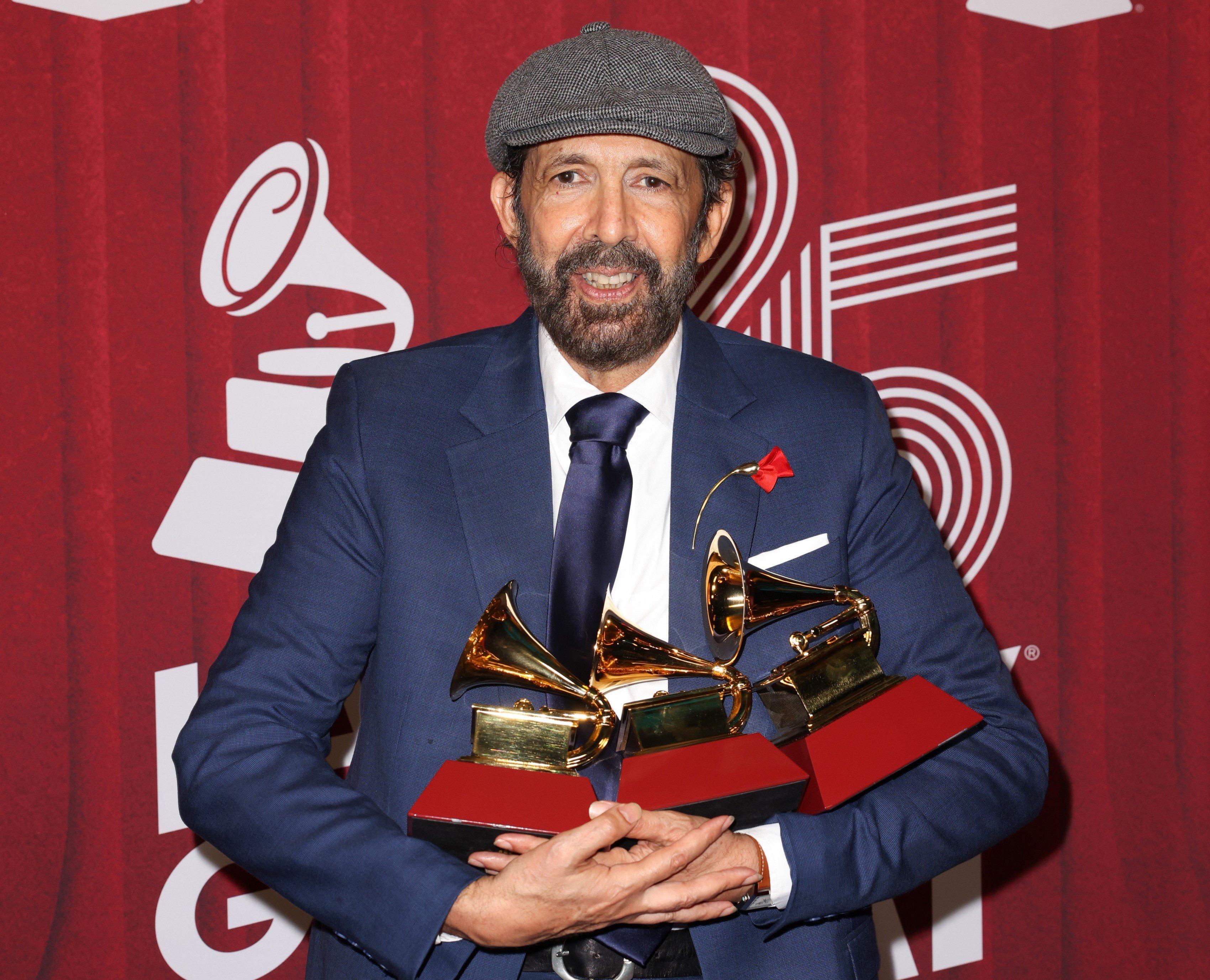
Photo: Alexander Tamargo/Getty Images for The Latin Recording Academy
list
Juan Luis Guerra Sweeps The 2024 Latin GRAMMYs With 'Radio Güira'
The legendary Dominican artist won Album Of The Year for a fifth time with his 2023 EP.
The 2024 Latin GRAMMYs marked 25 years of Latin music excellence with a gala evening in Miami, one of the world capitals for the Latin music industry. Replete with dazzling performances from legends and rising acts, tributes and tearful acceptance speeches, the 25th Annual Latin GRAMMYs was certainly one for the books.
In an evening with many leading lights, onelegend stood out as the night’s star: singer, songwriter and musician Juan Luis Guerra.
Guerra already had two dozen Latin GRAMMYs on his CV — as well as three GRAMMYs — but his run at this year’s Latin GRAMMYs netted several new pieces of hardware. His honors included the award Album Of The Year for Radio Güira, the inventive 2023 concept EP released with his band 4.40, and Record Of The Year for "Mambo 23," a hyper-speed merengue epic from the EP. Radio Güira also took the prize for Best Merengue/Bachata Album, while "Mambo 23" also won for Best Tropical Song.
These were Guerra's first wins in a major category since 2015, when he won Album Of The Year for Todo Tiene Su Hora at the 16th Annual Latin GRAMMY awards. Guerra has won Album Of The Year as an artist in 2007, 2010 and 2014, and in 2012 he won for his production work on Juanes' MTV Unplugged album.
Despite his familiarity with the Latin GRAMMYs stage, Guerra appeared emotional when he walked up to the stage for the last time to accept the award for Album Of The Year from Carlos Vives. Holding his Latin GRAMMY, Guerra praised God and credited Jesus with inspiring the album.
Earlier in the night, Guerra delighted the crowd at Miami’s Kaseya Center with a performance of "Mambo 23," featuring the full band. Dressed in his iconic newsboy cap and neckerchief, he launched into the dance floor burner on a stage illuminated in flashing neon. Boiler Suit-clad dancers completed a scene that was somehow both unassuming and spectacular.
Guerra has had a four-decade long career of innovating in Caribbean music, while bringing genres such bachata to international fame. Radio Güira continues the theme of boundary pushing. It has been praised for its experiments in combining old and new genres, from merengue to reggaeton, with dashes of jazz and blues.
Check out the complete list of winners and nominees at the 2024 Latin GRAMMYs.
Latest Recording Academy News & Initiatives
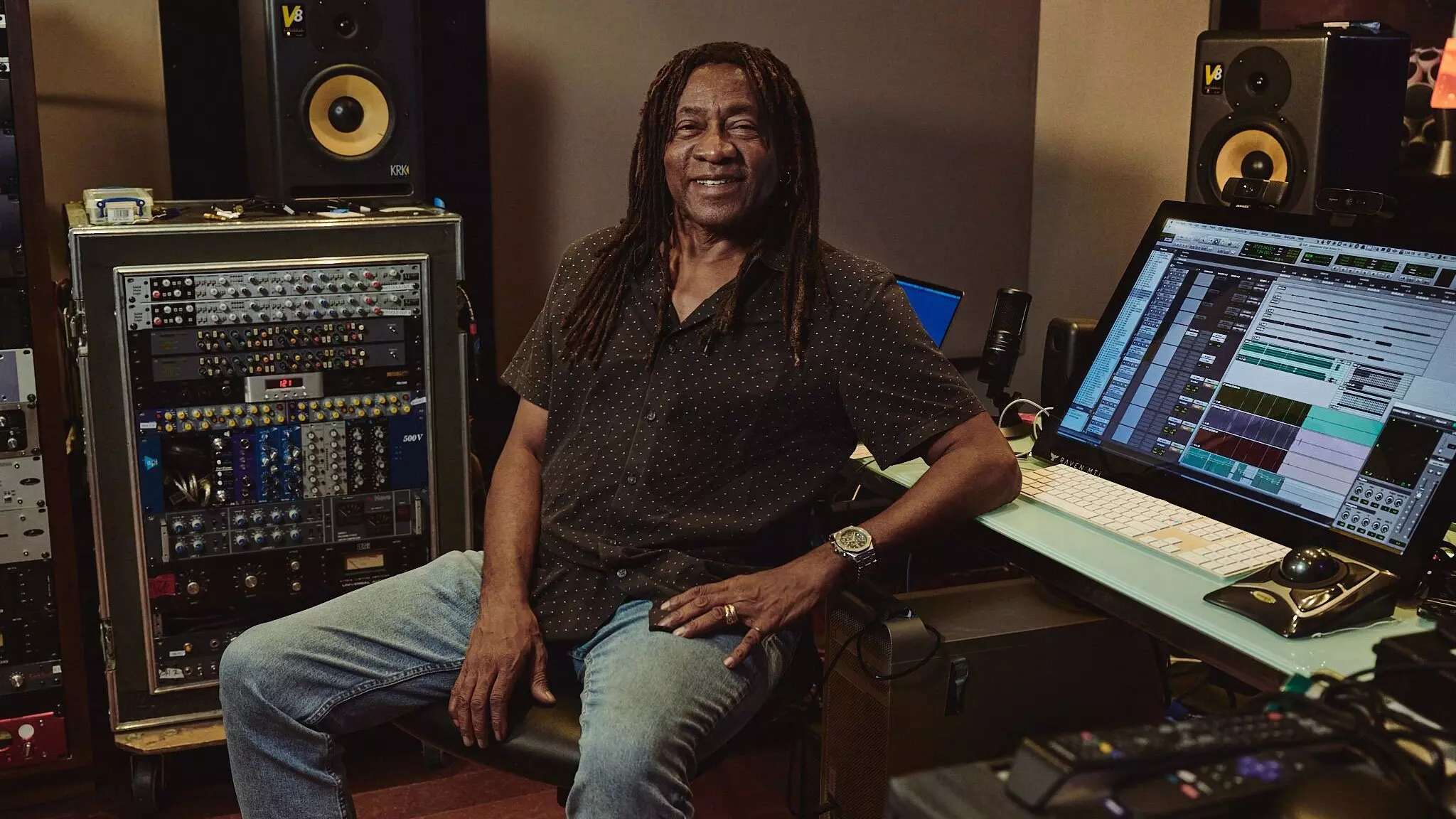
The Recording Academy Producers & Engineers Wing To Honor Jimmy Douglass During 2025 GRAMMY Week Celebration

10 Meaningful Moments From The 2024 Latin GRAMMYs: Karol G's Heartfelt Speech, Tributes To Late Legends & More

Behind The Scenes At Latin GRAMMY Week 2024: Inside VIP Celebrations & More
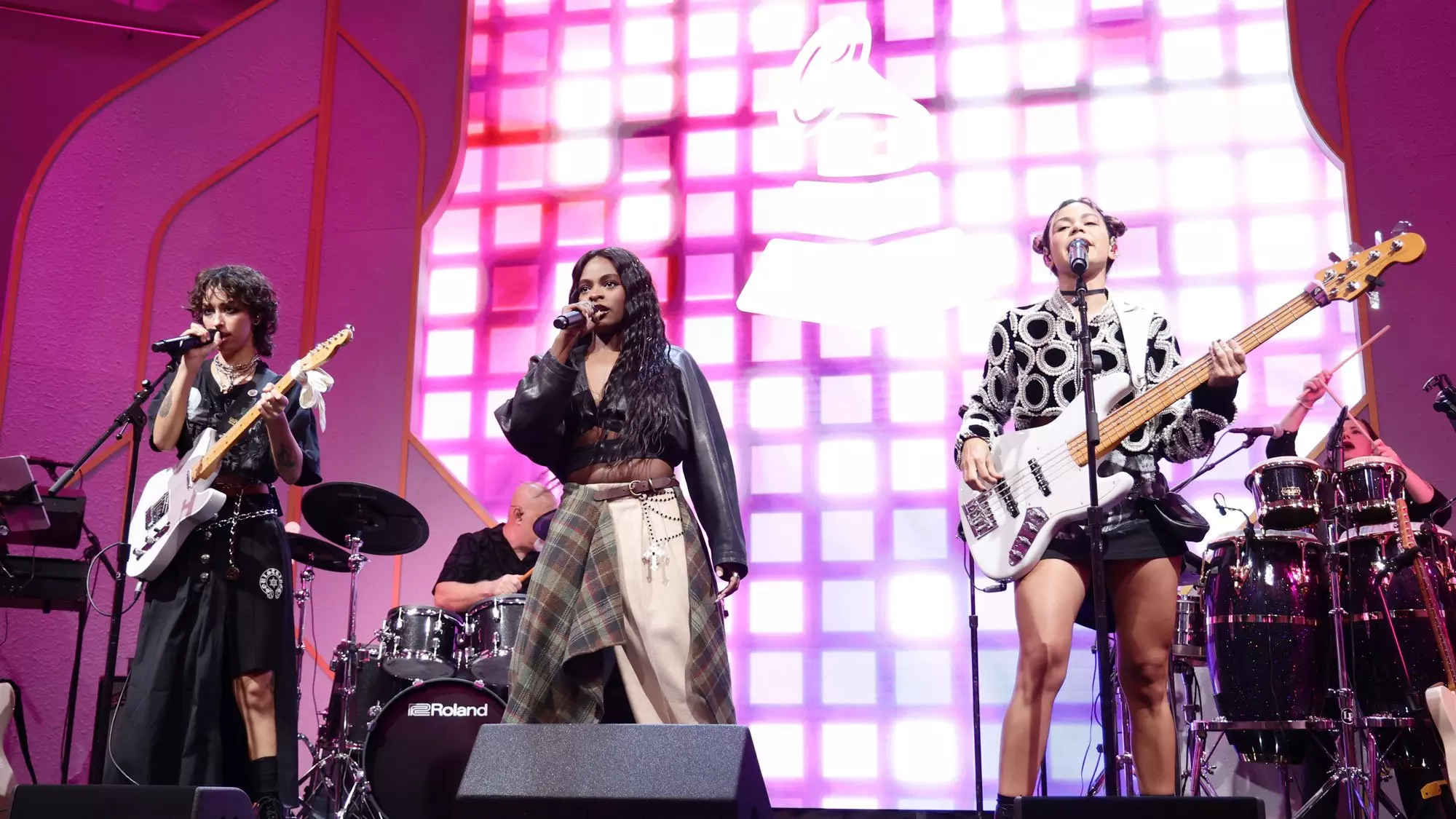
Agris, DARUMAS, Ela Taubert, Kevin Aguilar & More Perform At The 2024 Latin GRAMMYs Best New Artist Showcase

Amazon Music & Black Music Collective Announce Fourth Annual 'Your Future Is Now' Scholarship Program For HBCU Students
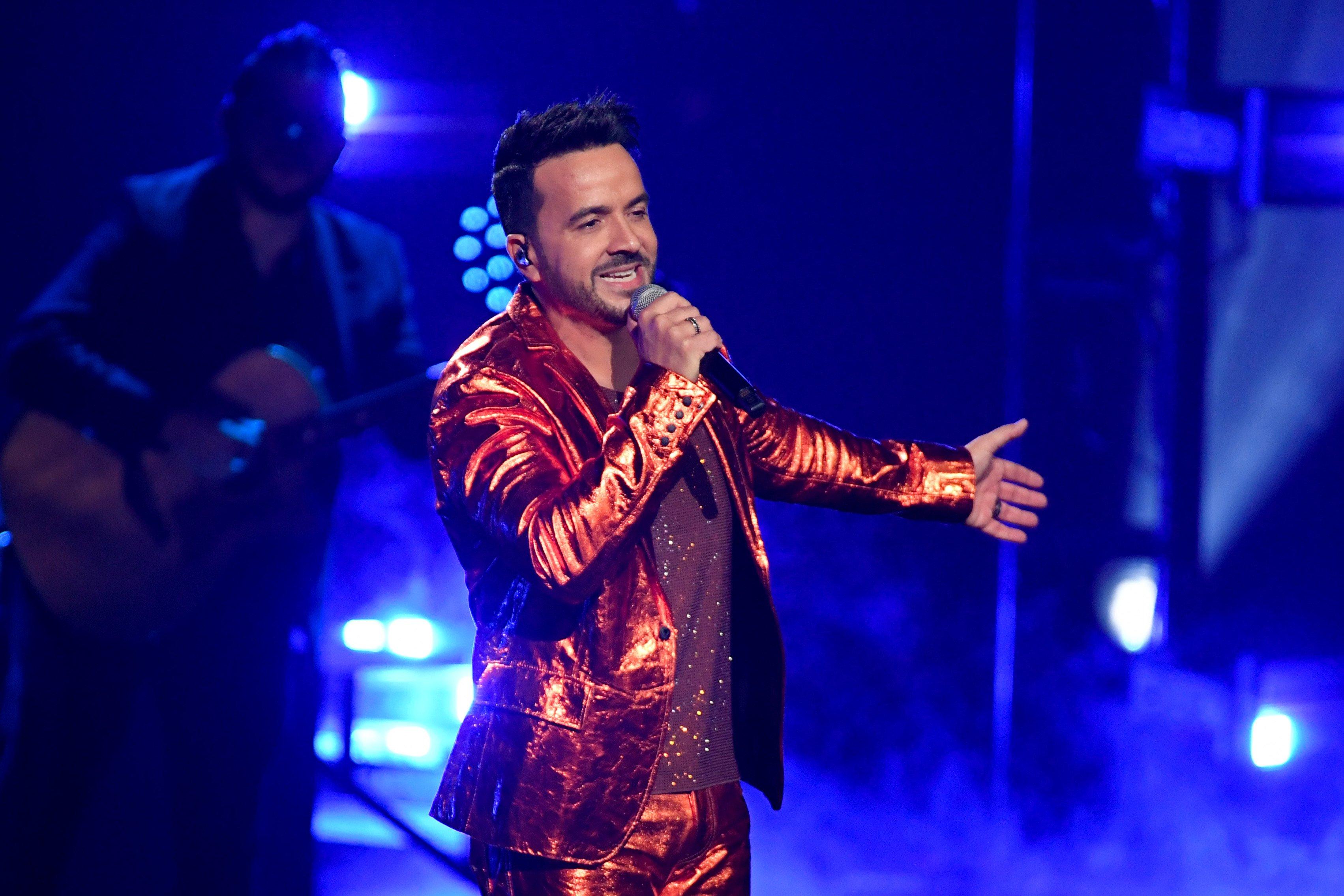
Photo: Jason Koerner/Getty Images
news
Watch: Luis Fonsi Performs "Despacito" & Two More Of His Classics At The 2024 Latin GRAMMYs
Just after winning his sixth Latin GRAMMY, the Puerto Rican star celebrated his win — and career — with a feel-good performance of "No Me Doy Por Vencido," "Despacito" and "Santa Marta."
The legacy of Luis Fonsi's career practically goes hand-in-hand with the history of the Latin GRAMMY Awards. Fresh off his win for Best Pop Vocal Album at the 2024 Latin GRAMMYs, the Puerto Rican pop icon performed a medley of his greatest hits.
The career-spanning performance began with his beloved 2008 ballad, "No Me Doy Por Vencido." In a sparkling orange suit, Fonsi belted his heart out to the song that's become an anthem of hope.
Dancers then joined him onstage for a sultry performance of his 2017 global smash, "Despacito," which had the whole audience — including Marc Anthony and his wife Nadia Ferreira — dancing along. Fonsi then closed out his live medley with the upbeat "Santa Marta" from his latest album, El Viaje; he danced into the audience where this year's Person Of The Year honoree, Carlos Vives, sang along with him.
The ambitious El Viaje, which was recorded in several different countries around the world, earned Fonsi a Latin GRAMMY win for Best Pop Vocal Album. It marks his 11th Latin GRAMMY nomination to date; he has won six Latin GRAMMYs, four of those thanks to "Despacito," which won Record Of The Year and Song Of The Year in 2017.
"What I'm most proud of is just that — it's a song that represents my heritage, my language, and the love of my island, Puerto Rico," Fonsi told GRAMMY.com about "Despacito" back in 2022. "It has that swag, that thing, that sabor that we carry in our blood. It's a celebration of all of that."
Just after the 2024 Latin GRAMMYs, Fonsi will add an exciting first to his resume: his film debut. The singer will star in the rom-com Say A Little Prayer, which opens in theaters on Nov. 22.
Check out the complete list of winners and nominees at the 2024 Latin GRAMMYs.
Latest In Latin Music, News & Videos

10 Meaningful Moments From The 2024 Latin GRAMMYs: Karol G's Heartfelt Speech, Tributes To Late Legends & More

Behind The Scenes At Latin GRAMMY Week 2024: Inside VIP Celebrations & More

Juan Luis Guerra Sweeps The 2024 Latin GRAMMYs With 'Radio Güira'

Watch: Luis Fonsi Performs "Despacito" & Two More Of His Classics At The 2024 Latin GRAMMYs

Watch: Juan Luis Guerra 4.40 Wins Album Of The Year For 'Radio Güira' | 2024 Latin GRAMMYs
